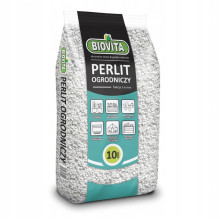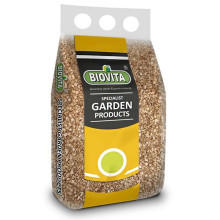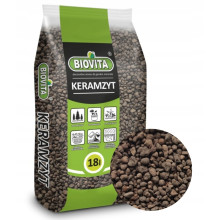- today
- label Plant cultivation
- favorite 1 likes
- remove_red_eye 13221 views
- comment 0 comments

Perlite, Vermiculite, and Garden Expanded Clay – Properties, Applications, Differences
Perlite, vermiculite, and garden expanded clay are crushed fragments of mineral rocks added to the soil to improve its structure. They prevent the soil from becoming too compact and sticking to the roots, which facilitates aeration. The soil becomes looser, more crumbly, and permeable. What should you know about these materials? What are the properties of perlite, vermiculite, and expanded clay? And how can they be applied? This article provides answers.
Perlite: A Plant Growth Stimulator
Perlite is a volcanic rock that increases in volume and transforms into an airy and lightweight granulate when heated – resulting in a product ready for use in agriculture and horticulture. The high temperature causes all water and gases to evaporate from the perlite. This gives it a porous structure, with granules up to 6 mm in diameter. Perlite is odorless, distinguished by its above-average durability and resistance to various atmospheric conditions.
Properties and Benefits of Perlite
Perlite protects roots from injuries and keeps them in good condition. It ensures all soil layers have proper access to oxygen. It accelerates plant growth and makes them more resistant to external factors.
Perlite also enhances the visual qualities of plants – making them lush green. It improves soil aeration and prevents excessive compaction. Moreover, it is chemically inert, warms the substrate, and stabilizes its pH. It is also pathogen-free and inhibits the growth of harmful fungi.
Since perlite decomposes very slowly, it can be used for a long time. Moreover, it can be reused after sterilization. It ensures better water drainage, making it ideal for plants that cannot grow in overly moist soil. Being a rock, perlite does not biodegrade. Its cost is also not high, and it is readily available.
Applications of Perlite
Perlite can be used in various ways.
Growers often use perlite as a filler for: potting soil, seed and cutting soil, and even for potted plant cuttings.
It can also be successfully used as a drainage addition at the bottoms of pots and planters for flowers and vegetables, as it moisturizes the substrate and prevents rotting.
Perlite improves the efficiency of fertilizers, as it is an excellent carrier of micro- and macro-elements.
Perlite is also useful in the cultivation of ornamental plants – particularly recommended for heavy, clayey soils with low permeability. It can also be used for loosening soil.
Perlite is effective in vegetable and flower cultivation under covers (including gerberas, cucumbers, or tomatoes).
It is often used in hydroponic cultivation of tomatoes and cucumbers, while at home, it is suitable for growing strawberries.
Perlite is also successful in vegetative propagation, i.e., in cuttings and seedlings. During the transplanting process, it prevents root damage.
Mixed with vermiculite, perlite is used as a hydroponic substrate in the cultivation method known as “hempy buckets”.
Perlite can also be used for lawn sanding.
Vermiculite: A Soil Moisture Regulator
Vermiculite is a clay mineral that, like perlite, increases its volume when heated – in this case, by up to 30 times. This process gives vermiculite a granular consistency, positively affecting soil structure, enhancing root development, and visibly improving plant condition.
Advantages and Properties of Vermiculite
Vermiculite is known for its high moisture retention capacity. It releases moisture gradually, providing plants with access to water and protecting them from drying out. Additionally, it reduces the need for frequent watering. Its ability to retain moisture also means that nutrients are less likely to be leached from the soil.
Vermiculite is also rich in magnesium, calcium, silicon, and iron, as well as nitrogen and potassium – essential elements for plants. It stimulates various biological processes. Like perlite, it does not biodegrade and is chemically inert.
Applications of Vermiculite
Here are the key applications of vermiculite.
Vermiculite is most commonly used as a soil additive.
It can be used to improve storage conditions for agricultural produce. Research shows that storing them with this type of aggregate prevents the risk of rotting processes by 30% longer than without it. This is because vermiculite absorbs gases resulting from these processes.
Vermiculite is also used for storing flower bulbs.
It aids in the rooting of cuttings.
This mineral can be used as a germination aid, as it speeds up the entire process. It also stimulates root development.
Vermiculite is excellent as a propagation substrate – eliminating the possibility of pathogen transmission. It increases the safety of cultivation.
Expanded Clay: The Perfect Drainage Agent
Expanded clay is a natural ceramic clay commonly used in the cultivation of ornamental plants. It is heated at high temperatures, causing it to swell and acquire a porous structure. This also makes it very hard. It comes in the form of small pellets of various diameters – from 5 mm to 2 cm. It's important to note that it is completely chemically and biologically inert.
In gardening, expanded clay has been used for a relatively short time, yet it already has a wide range of enthusiasts. This is partly because it is a very versatile material. Thanks to its red-brown color, it beautifully complements various plants. Increasingly, colored expanded clay is also appearing on the Polish market, allowing for even greater customization to your taste and needs.
Advantages and Properties of Expanded Clay
Thanks to its porous structure and low water absorption, expanded clay ensures excellent drainage. This material is also distinguished by its lightness and sterility, and it provides optimal moisture for the substrate and good aeration – which, in turn, allows roots to grow freely. It also facilitates air circulation in the pot.
Expanded clay does not react with any plant. It loosens the soil but does not acidify it. It protects the soil from drying out, freezing, and overheating, and the roots - from insects and rodents. A significant advantage of expanded clay is its low cost. It's worth adding that it is a natural, ecological, and 100% safe material for the environment. It can be reused any number of times.
Applications of Expanded Clay
Expanded clay has a very wide range of applications in gardening. Here are some examples:
- Expanded clay is excellent as drainage in pots and planters. It ensures that flowers, shrubs, and small trees are better hydrated and protected against potential drought.
- It can also be used as a humidifier.
- Expanded clay works well as mulch and an insulating material.
- It is also great for hydroponic cultivation, especially for cucumbers. It performs well in terraponic cultivation of flowers and vegetables in pots.
- Expanded clay is increasingly used in the construction of green roofs. It provides thermal insulation, helps plants root, and serves as an excellent drainage layer.
- Expanded clay can be successfully used in the construction of garden paths, especially in wet areas.
- It can be used as a decorative topping to highlight the beauty of plants. It can also be layered in glass pots, which provides wonderful visual effects.
Perlite, Vermiculite, Expanded Clay – Common Features and Differences
Here are the common features of perlite, vermiculite, and expanded clay:
- They are wonderful additions to potting soil mixtures.
- They have a wide range of applications in gardening.
- They are extracted from the earth and then heated, which causes them to expand (swell).
- They are lightweight, affordable, and readily available.
- They are chemically inert.
- They do not biodegrade.
- They can often be used interchangeably.
All types of soil amendments are characterized by varying degrees of granularity and grinding.
It's worth noting that vermiculite is often used in conjunction with perlite. It can be said that they complement each other. Perlite drains water well but retains it poorly, while vermiculite stores moisture and at the same time compacts the soil. Therefore, they are eagerly used as additions to many gardening substrates.
Vermiculite is distinguished mainly by its ability to regulate soil moisture. Perlite accelerates plant growth and is suitable for use in greenhouses. Expanded clay, on the other hand, is excellent for drainage, significantly reducing the risk of overwatering – making it ideal for those with a "heavy hand" when watering.





Comments (0)